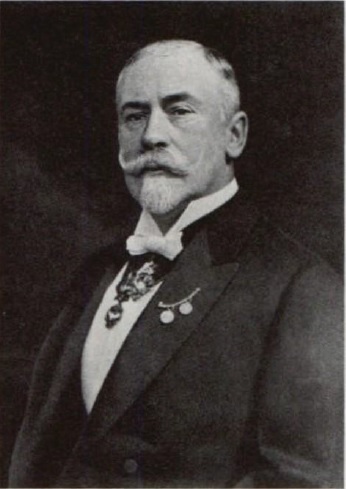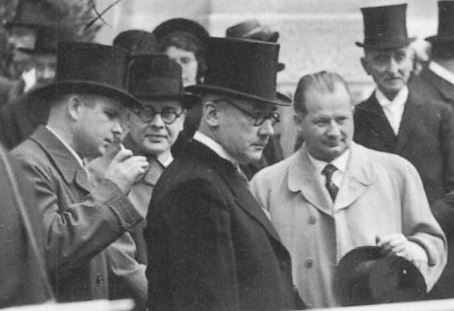|
Josef Peer
Josef Peer (13 June 1864 – 28 June 1925) was an Austrian lawyer and politician who served as the Governor of Liechtenstein from 1920 to 1921. Early life and Austrian career Peer was born on 13 June 1864 as the son of Josef Ignaz, an Austrian customs officer and his mother Fuetscher née Barbara. He spent a part of his youth in Schaan, where he attended Elementary school. He attended high school in Feldkirch then went on to study law at the University of Innsbruck, where he received a diploma in 1887. In 1894 he opened his own law firm in Feldkirch. From 1901 to 1909 he was the mayor of Feldkirch. From 1902 to 1909 and again from 1914 to 1918 he was a member of the Landtag of Vorarlberg, where he was appointed as the state governor. Charles I was said to have been planning to appoint Peer as Minister of justice, but this did not fall through due to the dissolution of Austria-Hungary in 1918. Governor of Liechtenstein Peer was the Governor of Liechtenstein, serving from 15 ... [...More Info...] [...Related Items...] OR: [Wikipedia] [Google] [Baidu] |
List Of Heads Of Government Of Liechtenstein
This is a list of heads of government of Liechtenstein. The current () is Daniel Risch, since 25 March 2021. Head of government Provincial administrator (1861–1921) The () was the title of the head of government from 1861 to 1921. Prime Minister (1921–present) The () is the current title for the head of government. Deputy head of government See also *Politics of Liechtenstein *Prince of Liechtenstein *Lists of incumbents These are lists of incumbents (individuals holding offices or positions), including heads of states or of subnational entities. A historical discipline, archontology, focuses on the study of past and current office holders. Incumbents may al ... References External linksWorld Statesmen – Liechtenstein {{DEFAULTSORT:Heads of government of Liechtenstein 1921 establishments in Liechtenstein Politics of Liechtenstein Liechtenstein, Head of Government * Lists of Liechtenstein people ... [...More Info...] [...Related Items...] OR: [Wikipedia] [Google] [Baidu] |
Progressive Citizens' Party
The Progressive Citizens' Party in Liechtenstein (german: Fortschrittliche Bürgerpartei in Liechtenstein, FBP) is a national-conservative political party in Liechtenstein. The FBP is one of the two major political parties in Liechtenstein, along with the liberal-conservative Patriotic Union. Founded in 1918 along with the now-defunct Christian-Social People's Party, it is the oldest extant party in Liechtenstein. History The party was established in 1918 by middle class citizens and members of the agricultural community as a response to the formation of the Christian-Social People's Party (VP).Vincent E McHale (1983) ''Political parties of Europe'', Greenwood Press, p609 It won the majority of the elected seats in the 1918 elections, Nohlen, D & Stöver, P (2010) ''Elections in Europe: A data handbook'', p1182 but the VP formed a government.McHale, p611 The VP won elections in 1922, January 1926 and April 1926, but the FBP won the 1928 elections, and became the party o ... [...More Info...] [...Related Items...] OR: [Wikipedia] [Google] [Baidu] |
Heads Of Government Of Liechtenstein
A head is the part of an organism which usually includes the ears, brain, forehead, cheeks, chin, eyes, nose, and mouth, each of which aid in various sensory functions such as sight, hearing, smell, and taste. Some very simple animals may not have a head, but many bilaterally symmetric forms do, regardless of size. Heads develop in animals by an evolutionary trend known as cephalization. In bilaterally symmetrical animals, nervous tissue concentrate at the anterior region, forming structures responsible for information processing. Through biological evolution, sense organs and feeding structures also concentrate into the anterior region; these collectively form the head. Human head The human head is an anatomical unit that consists of the skull, hyoid bone and cervical vertebrae. The term "skull" collectively denotes the mandible (lower jaw bone) and the cranium (upper portion of the skull that houses the brain). Sculptures of human heads are generally b ... [...More Info...] [...Related Items...] OR: [Wikipedia] [Google] [Baidu] |
Ludwig Marxer
Ludwig Marxer (27 April 1897 – 20 February 1962) was an advocate and political figure from Liechtenstein who served as the List of heads of government of Liechtenstein, Deputy Prime Minister of Liechtenstein from 1928 to 1933. Early life Marxer was born on 27 April 1897 in Eschen as one of eight children. His father by the same name was mayor of Eschen until 1898, when he and his family moved to Vaduz. Marxer attended high school in Feldkirch, Vorarlberg, Feldkirch and then studied law and political science at the University of Innsbruck from 1922 to 1924. Career He founded his own law firm Marxer & Partner Rechtsanwälte in 1925, as of 2023 this the largest law firm in Liechtenstein.Marxer entered politics as a member of the Progressive Citizens' Party and remained so from 1928 to 1945. He had a friendship with Josef Hoop and was appointed to serve List of heads of government of Liechtenstein, Deputy Prime Minister of Liechtenstein on 4 August 1928, the same day Hoop himse ... [...More Info...] [...Related Items...] OR: [Wikipedia] [Google] [Baidu] |
Supreme Administrative Court Of Austria
In the Republic of Austria, the Supreme Administrative Court (german: Verwaltungsgerichtshof or ) is the appellate court to which appeals may be made from the decisions of the country's eleven administrative trial courts. The Supreme Administrative Court also resolves demarcation disputes within the administrative court system and hears complaints about administrative trial courts that fail to issue verdicts legally required of them in a timely manner. The court does not have a fixed number of members. The theoretical minimum is seven; the actual number, as of June 2018, is about seventy. Members are appointed by the President of Austria on nomination of the cabinet. With respect to most appointments, the cabinet is limited to choosing from a shortlist of three candidates provided by the court. The court is subdivided into 21 panels of three to five members each, each panel handling cases in a specific area of law. The current president of the Supreme Administrative Court, appoin ... [...More Info...] [...Related Items...] OR: [Wikipedia] [Google] [Baidu] |
Prime Minister Of Liechtenstein
This is a list of heads of government of Liechtenstein. The current () is Daniel Risch, since 25 March 2021. Head of government Provincial administrator (1861–1921) The () was the title of the head of government from 1861 to 1921. Prime Minister (1921–present) The () is the current title for the head of government. Deputy head of government See also *Politics of Liechtenstein *Prince of Liechtenstein *Lists of incumbents These are lists of incumbents (individuals holding offices or positions), including heads of states or of subnational entities. A historical discipline, archontology, focuses on the study of past and current office holders. Incumbents may al ... References External linksWorld Statesmen – Liechtenstein {{DEFAULTSORT:Heads of government of Liechtenstein 1921 establishments in Liechtenstein Politics of Liechtenstein Liechtenstein, Head of Government * Lists of Liechtenstein people ... [...More Info...] [...Related Items...] OR: [Wikipedia] [Google] [Baidu] |
Constitution Of Liechtenstein
The Constitution of the Principality of Liechtenstein (german: Verfassung des Fürstentums Liechtenstein) was promulgated on 5 October 1921, replacing the 1862 constitution. It was granted by Johann II, Prince of Liechtenstein, and established the rule of partial parliamentary democracy mixed with that of constitutional monarchy, as well as providing for referendums on decisions of the Landtag. Nohlen, D & Stöver, P (2010) ''Elections in Europe: A data handbook'', p1156 It also abolished the three seats in the Landtag appointed by the Prince and lowered the voting age from 24 to 21. The country replaced universal male suffrage with universal suffrage, following a national referendum in 1984. Chapters The constitution has twelve chapters: *Chapter I. The Principality *Chapter II. The Reigning Prince *Chapter III. Responsibilities of the State *Chapter IV. General Rights and Obligations of Liechtenstein Citizens *Chapter V. The Parliament *Chapter VI. The National Committee *C ... [...More Info...] [...Related Items...] OR: [Wikipedia] [Google] [Baidu] |
Dieter Nohlen
Dieter Nohlen (born 6 November 1939) is a German academic and political scientist. He currently holds the position of Emeritus Professor of Political Science in the Faculty of Economic and Social Sciences of the University of Heidelberg. An expert on electoral systems and political development, he has published several books. IDEA Bibliography Books published by Nohlen include: *''Electoral systems of the world'' (in German, 1978) *''Lexicon of politics'' (seven volumes) *''Elections and Electoral Systems'' (1996) *''Elections in Africa: A Data Handbook'' (1999 with Michael Krennerich and Bernhard Thibaut) *''Elections in Asia and the Pacific: A Data Handbook'' (2001 with and Christof Hartmann) ** ''Volume 2: South East Asia, East Asia, and the Pacific'' (2002), *''Vo ...[...More Info...] [...Related Items...] OR: [Wikipedia] [Google] [Baidu] |
1921 Liechtenstein Regierungsverweser Referendum
A referendum on whether the Regierungsverweser J Peer should remain in office was held in Liechtenstein on 28 March 1921.Dieter Nohlen Dieter Nohlen (born 6 November 1939) is a German academic and political scientist. He currently holds the position of Emeritus Professor of Political Science in the Faculty of Economic and Social Sciences of the University of Heidelberg. An expe ... & Philip Stöver (2010) ''Elections in Europe: A data handbook'', p1170 Around 62% voted in favour of Peer continuing in office. Results References {{Liechtenstein elections 1921 referendums 1921 in Liechtenstein Referendums in Liechtenstein March 1921 events ... [...More Info...] [...Related Items...] OR: [Wikipedia] [Google] [Baidu] |
Judiciary
The judiciary (also known as the judicial system, judicature, judicial branch, judiciative branch, and court or judiciary system) is the system of courts that adjudicates legal disputes/disagreements and interprets, defends, and applies the law in legal cases. Definition The judiciary is the system of courts that interprets, defends, and applies the law in the name of the state. The judiciary can also be thought of as the mechanism for the resolution of disputes. Under the doctrine of the separation of powers, the judiciary generally does not make statutory law (which is the responsibility of the legislature) or enforce law (which is the responsibility of the executive), but rather interprets, defends, and applies the law to the facts of each case. However, in some countries the judiciary does make common law. In many jurisdictions the judicial branch has the power to change laws through the process of judicial review. Courts with judicial review power may annul the laws ... [...More Info...] [...Related Items...] OR: [Wikipedia] [Google] [Baidu] |
Swiss Federal Constitution
The Federal Constitution of the Swiss Confederation (SR 10; german: Bundesverfassung der Schweizerischen Eidgenossenschaft (BV); french: Constitution fédérale de la Confédération suisse (Cst.); it, Costituzione federale della Confederazione Svizzera (Cost.); rm, ) of 18 April 1999 (SR 101) is the third and current federal constitution of Switzerland. It establishes the ''Swiss Confederation'' as a federal republic of 26 cantons (states). The document contains a catalogue of individual and popular rights (including the right to call for popular referendums on federal laws and constitutional amendments), delineates the responsibilities of the cantons and the Confederation and establishes the federal authorities of government. The Constitution was adopted by a referendum on 18 April 1999, in which a majority of the people and the Cantons voted in favour. It replaced the prior federal constitution of 1874, which it was intended to bring up to date without changing its ... [...More Info...] [...Related Items...] OR: [Wikipedia] [Google] [Baidu] |




